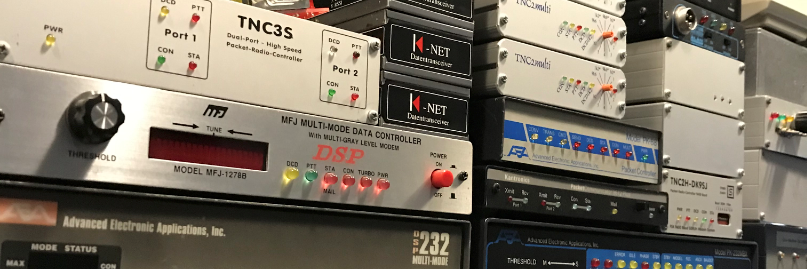I had some problems getting the flexnet destinations in uronode. Xnet node is running with various flexnet links. Now I also want uronode to know these flexnet destinations. There appears to be a small secret in the “prompt” that flexd expects. I had a prompt “pi1lap ==>” That is not what flexd expected. Flexd expects a prompt “=>” So now I had to adjust the Xnet prompt to the expectations of flexd. (Tnx Brian n1uro for the hint)
Maybe the “pi1lap =>” prompt will work, I have to test that
There is also something with the buffer size of flexd. See the README.flexd in the source dir.
root@gw:/etc/ax25# cat /usr/local/src/uronode-2.8/README.flexd If you find that your flexd isn't properly working, scroll down to line 120 where it says: char buffer[256], port[14], path[AX25_MAX_DIGIS*10] and adjust the buffer per your neighbor's screens. The formula is: 2 data frames: 256 3 data frames: 512 4 data frames: 1024
Okay so how muts frames i have, let’s have a look
[3] fm PI1LAP-15 to PI1LAP ctl SABM+ [3] fm PI1LAP to PI1LAP-15 ctl UA- [3] fm PI1LAP to PI1LAP-15 ctl I00^ pid F0 (211) (X)net V1.39 Node PI1LAP
That are 2 frames. I had to set the buffer size to 256 and recompile flexd.c
int download_dest(char *gateway, char *fname)
{
FILE *tmp;
char buffer[256], port[14], path[AX25_MAX_DIGIS*10];
Also i have made a change to line 277. Also change to 256 buffer size
if (FD_ISSET(s, &read_fd)) {
// if ((n = read(s, buffer, 512)) == -1) break;
if ((n = read(s, buffer, 256)) == -1) break;
Setup flexd.conf
# /etc/ax25/flexd.conf # see man flexd.conf # The callsign-ssid you wish to poll your flex neighbor with: MyCall pi1lap-15 # How often do we poll our flex neighbor (in seconds): PollInterval 300 # The FlexNet node we're to poll: FlexGate pi1lap
The prompt for Xnet
root@gw:/etc/ax25# grep prompt /usr/local/xnet/AUTOEXEC.NET my prompt =>
Let’s give it a try.
[3] fm PI1LAP-15 to PI1LAP ctl SABM+ [3] fm PI1LAP to PI1LAP-15 ctl UA- [3] fm PI1LAP to PI1LAP-15 ctl I00^ pid F0 (211) (X)net V1.39 Node PI1LAP Lap = F6fbb bbs PI8LAP Jnos = Jnos 2.0k.1 PD2LT Dx = Cluster Dxspider PI1LAP-4 Uro = Uronode PI1LAP-15 => [3] fm PI1LAP-15 to PI1LAP ctl I10^ pid F0 (2) d [3] fm PI1LAP to PI1LAP-15 ctl I11^ pid F0 (236) BBS 0-0 33 CE8FGC 0-0 33 CX2SA 0-0 34 CX2SA 5-5 5 DB0ERF 0-12 4 DB0ERF 13-13 3 DB0ERF 14-14 30 DB0ERF 15-15 30 DB0RES 0-9 5 DB0RES 10-10 4 DB0ZWI 0-1 6 DB0ZWI 3-3 [3] fm PI1LAP to PI1LAP-15 ctl I12^ pid F0 (236) 5 DB0ZWI 4-15 4 DH4LAR 1-1 4 DL0HBS 7-7 30 F1ZYS 8-8 10 F3KT 0-10 4 F4DUR 7-7 5 F4DUR 8-8 39 F5ZFC 0-7 132 F8KHI 3-3 39 F8KHI 7-7 39 FGCBBS 0-0 33 HB9CSR 1-1 [3] fm PI1LAP to PI1LAP-15 ctl I13^ pid F0 (236) 40 HB9CSR 3-3 5 HB9CSR 8-8 40 HB9ON 1-1 39 HB9ON 8-8 34 HB9ON 9-9 34 HB9ON 10-10 4 HB9ON 14-14 5 HG0PLA 0-0 5 HG6PGA 0-0 109 HG8IT 0-0 35 HG8LXL 0-0 31 HG8PCS 0-0
Uronode
pd2lt@uro.pd2lt.ampr.org-IPv6: d FlexNet Destinations: BBS 0-0 34 CE8FGC 0-0 34 CX2SA 0-0 35 CX2SA 5-5 5 DB0ERF 0-12 5 DB0ERF 13-13 4 DB0ERF 14-14 31 DB0ERF 15-15 31 DB0RES 0-9 6 DB0RES 10-10 5 DB0ZWI 0-1 7 DB0ZWI 3-3 6 DB0ZWI 4-15 5 DH4LAR 1-1 5 DL0HBS 7-7 31 F1ZYS 8-8 6 F3KT 0-10 4 F4DUR 7-7 5 F4DUR 8-8 39 F5ZFC 0-7 116 F8KHI 3-3 39 F8KHI 7-7 39 FGCBBS 0-0 34 HB9CSR 1-1 41
Yes, all looks okay.
The flexnet destinations are saved in “/usr/local/var/ax25/flex” on a debian wheezy system.

